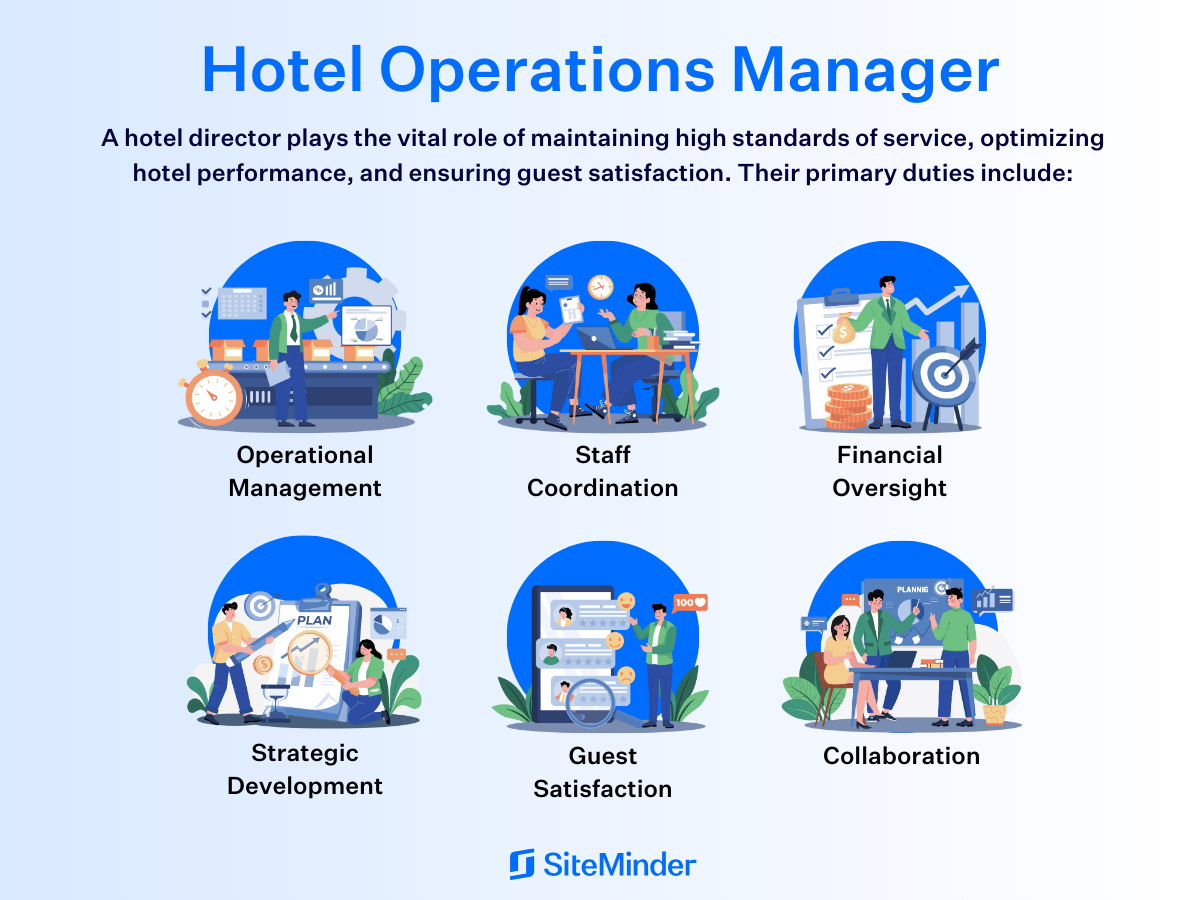What is a hotel operations manager?
A hotel operations manager is responsible for overseeing the day-to-day functions of a hotel, ensuring seamless coordination between departments, maintaining high service standards, and optimising overall efficiency. Their role is central to delivering an excellent guest experience while balancing cost control, staffing, and operational workflows.
With the global hotel and resort industry valued at $1.5 trillion in 2023, the demand for skilled operations managers has never been higher. Hotels of all sizes—particularly medium-sized chains—need professionals who can navigate the complexities of modern hospitality, from enhancing guest experiences to managing rising costs. In fact, the employment of lodging managers is projected to grow by 10% from 2023 to 2033, highlighting the increasing need for expertise in hotel operations.
Hotel operations definition
Hotel operations encompass all activities and processes that contribute to the daily running of a hotel. This includes guest services, housekeeping, food and beverage management, maintenance, financial administration, and staff supervision. Effective hotel operations ensure that all these departments work together efficiently to provide a seamless guest experience while optimising costs and revenue.
A well-managed hotel not only improves guest satisfaction but also directly impacts profitability. With occupancy rates projected to increase by 2.5% in 2024 and the average daily rate (ADR) expected to grow by 4.9%, operations managers play a crucial role in adapting to fluctuating demand, controlling expenses, and leveraging the latest technology to stay ahead of competitors.
What does a hotel operations manager do?
The responsibilities of a hotel operations manager extend across multiple areas, ensuring that every aspect of the hotel runs smoothly:
- Guest experience: From check-in to check-out, the operations manager ensures guests receive exceptional service. In a highly competitive industry, even small improvements in service quality can lead to higher occupancy rates and repeat bookings.
- Staff supervision: The operations manager oversees key departments—including the front desk, housekeeping, and maintenance—ensuring that employees are trained, motivated, and working efficiently.
- Budget management: With operating costs rising, managing budgets effectively is crucial. Operations managers must balance cost control with maintaining high-quality services, ensuring that every dollar spent contributes to profitability.
- Technology integration: Digital transformation is reshaping hotel operations. Managers who leverage automated booking systems, AI-driven customer service, and data analytics tools can improve operational efficiency and guest satisfaction.
- Compliance & safety: Ensuring the hotel meets industry regulations, health and safety standards, and environmental guidelines is a core responsibility. This is particularly important as hotels focus on sustainability and energy efficiency to meet modern consumer expectations.
In medium-sized hotel chains, the operations manager must also adapt to industry trends, leverage data-driven insights, and continuously optimise internal processes to remain competitive.
In this blog we’ll cover everything you need to know about the role of a hotel operations manager, including the most crucial duties and skills required.
Table of contents
Why the role of hotel operations manager is important
A hotel’s success is directly tied to the efficiency of its operations. Whether it’s ensuring rooms are spotless, guests are satisfied, or expenses are under control, the hotel operations manager plays a pivotal role in maximising profitability and maintaining a seamless guest experience.
As the hospitality industry becomes more competitive, operational inefficiencies—whether in staff scheduling, service quality, or cost control—can lead to lost revenue and reduced guest satisfaction. Hotels that operate efficiently are in a stronger position to capitalise on industry growth, adapt to shifting market conditions, and meet evolving guest expectations.
Beyond financial performance, operations managers also influence staff retention and morale. Given that labor shortages continue to challenge the hospitality sector, a well-managed team can be a hotel’s biggest asset.
Hotel operations manager vs general manager
While both hotel operations managers and general managers (GMs) are responsible for overseeing the hotel, their roles differ significantly in scope and focus.
| Aspect | Hotel Operations Manager | General Manager |
| Focus | Day-to-day hotel functions | Overall hotel strategy and performance |
| Key responsibilities | Managing guest services, staffing, budgeting, and operations | Revenue growth, marketing, brand positioning, and long-term planning |
| Decision-making level | Tactical, overseeing individual departments | Strategic, working with owners and stakeholders |
| Financial oversight | Expense control and daily budgeting | Full P&L responsibility, financial forecasting |
A hotel operations manager ensures the smooth execution of daily functions, coordinating between departments to deliver a consistent guest experience. In contrast, the general manager takes a broader leadership role, overseeing long-term business strategy, revenue growth, and high-level financial decisions.
For medium-sized hotel chains, operations managers are often the ones implementing the GM’s vision on a practical level. By optimising workflows, handling staffing challenges, and managing costs, they ensure the hotel runs efficiently while keeping guest satisfaction high.
Streamline hotel operations manager duties with SiteMinder Ready to transform your hotel operations? Take control of your hotel’s efficiency with SiteMinder’s industry-leading platform.
Hotel operations manager skills required
To successfully manage a hotel’s daily operations, an operations manager must possess a diverse skill set that balances leadership, financial oversight, problem-solving, and technology adoption. Unlike other hospitality roles that focus on a single department, hotel operations managers coordinate multiple teams, ensuring all aspects of the guest experience run smoothly while keeping costs under control.
The key skills required for a hotel operations manager include:
- Leadership & team management: Overseeing staff across various departments, maintaining morale, and ensuring efficiency in daily operations. Strong leadership fosters a positive work culture, which translates into better guest service and lower employee turnover.
- Financial acumen: Managing budgets, controlling costs, and monitoring revenue streams to maintain profitability. With rising operational costs, an operations manager must make data-driven decisions to optimise expenses.
- Guest experience & service excellence: Ensuring a seamless guest journey, from check-in to check-out. Operations managers play a direct role in maintaining high service standards, handling complaints, and responding to guest feedback.
- Problem-solving & crisis management: From overbookings to last-minute staffing shortages, operations managers need to think on their feet and implement solutions that prevent disruptions.
- Technology & data proficiency: The ability to leverage hotel management software, analytics tools, and automation is now essential. Hotels that implement smart technology solutions can streamline processes, improve reporting, and enhance the guest experience.
- Regulatory & compliance knowledge: Understanding health and safety laws, labor regulations, and environmental guidelines is crucial to keeping the hotel compliant and avoiding legal risks.
Common hotel operations manager interview questions
For hotel owners hiring an operations manager, or for candidates preparing for the role, it’s helpful to know the most common interview questions that assess the necessary skills and experience.
Here are some key questions typically asked in hotel operations manager interviews:
- Can you describe a time when you had to handle a difficult guest complaint? How did you resolve it?
- What strategies do you use to improve staff productivity and morale?
- How do you balance cost control while maintaining high service standards?
- What hotel management software and tools have you used?
- Tell us about a time when you had to handle an operational crisis. What steps did you take?
- How do you stay up to date with industry trends and best practices?

Key hotel operations manager responsibilities
With RevPAR (Revenue Per Available Room) declining by 7.7% year-over-year and ADR falling by 4.4% in September 2024, hotels face increasing pressure to streamline operations and optimise costs. Effective hotel operations managers play a crucial role in maintaining profitability by ensuring all departments function smoothly while keeping expenses in check.
Manage daily operations
At the heart of a hotel’s performance is how well its daily operations are managed. This includes front desk coordination, housekeeping, maintenance, and food & beverage services. A hotel operations manager ensures each department functions efficiently, with minimal disruptions.
Staff management
With labor shortages often affecting the hospitality industry, hiring, retaining, and upskilling the right staff is one of the biggest challenges for hotel operations managers. Staff turnover can increase operational costs and disrupt service quality, making employee satisfaction and retention a key priority.
Cost management
With operational costs rising, budgeting and expense control are key responsibilities of a hotel operations manager. Poor financial management can quickly erode profitability, especially in a competitive market.
Inventory management
A hotel operations manager plays a crucial role in overseeing inventory control, ensuring that all departments—from housekeeping to food and beverage—have the necessary supplies while keeping costs in check. Effective inventory management directly impacts both guest experience and profitability, preventing shortages that could disrupt service or excess stock that ties up capital unnecessarily.
Servicing guests
Guest satisfaction is the cornerstone of a successful hotel, and a large part of an operations manager’s role involves ensuring exceptional service quality. Guests expect higher service levels to justify premium pricing.
Safety & compliance
Regulatory compliance is non-negotiable in the hospitality industry. Failure to meet safety, health, and legal standards can lead to fines, lawsuits, or reputational damage.
Reporting
Data is a powerful tool for hotel operations managers. Monitoring performance metrics helps identify areas of improvement, track progress, and adjust strategies as needed.
Using technology to assist in hotel operations manager duties
Technology has become an essential tool for hotel operations managers, enabling them to streamline workflows, improve efficiency, and enhance the guest experience. With increasing pressure to optimise costs and maintain service quality, leveraging hotel management software and automation tools has become a competitive necessity rather than a luxury.
A well-equipped operations manager doesn’t just oversee daily tasks—they also implement and manage technology solutions that make those tasks more efficient. From automating reservations and room assignments to tracking staff performance and inventory levels, technology reduces manual workload and provides real-time data for better decision-making.
Some of the most impactful technology solutions for hotel operations managers include:
- Property management systems (PMS) – Centralises booking, check-ins, housekeeping schedules, and billing, improving operational visibility.
- Channel management software – Ensures room availability and pricing are synced across all booking platforms, reducing overbookings.
- AI-Driven customer service tools – Chatbots and automated messaging systems streamline guest communication and reduce front desk workload.
- Smart inventory management systems – Tracks stock levels in real time, preventing shortages and minimising waste.
- Data analytics & reporting dashboards – Provides insights into revenue trends, guest satisfaction, and staff productivity, allowing managers to make informed decisions.
With hotels that integrate smart technology seeing a significant increase in operational efficiency, operations managers who embrace digital transformation can significantly improve performance. By adopting the right tools, they not only reduce costs and administrative burdens but also free up time to focus on strategic improvements and guest satisfaction.

